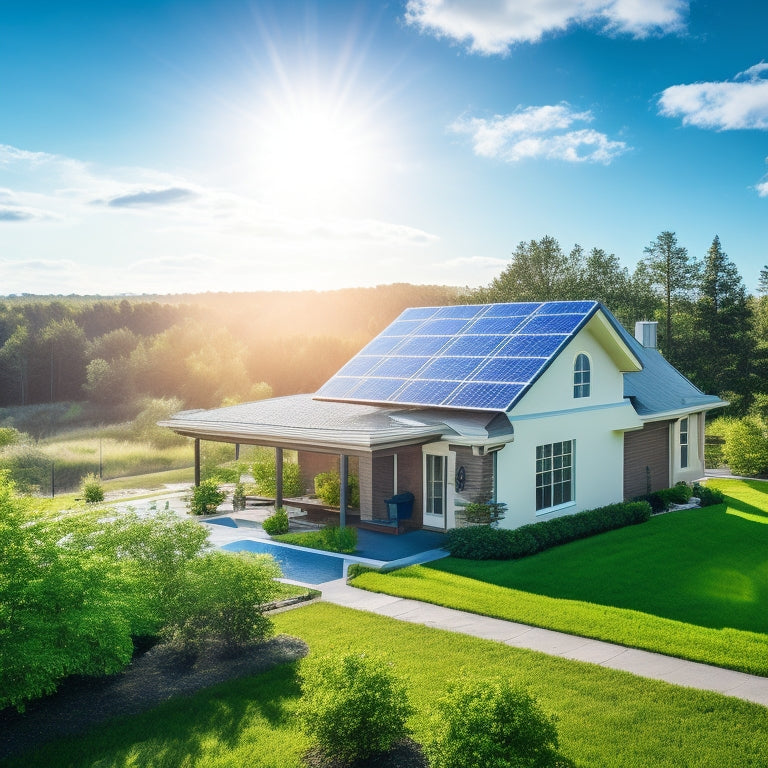
Top 10 Tips for Choosing a Solar Installer
Share
When choosing a solar installer, you'll want to check their licenses and certifications, ensuring they meet industry standards. Verify their insurance coverage, including workers' compensation and liability insurance. Research online reviews to get a sense of their reputation. Ask about warranty options, including duration and transferability. Evaluate their installation experience, examining their track record and adaptability. Judge their customer service, including responsiveness and emergency support. Check their industry affiliations and review contract terms carefully. By doing your due diligence, you'll be well on your way to finding a reliable and competent solar installer - and that's just the beginning of your journey to a successful installation.
Key Takeaways
• Verify the installer's licenses, certifications, and compliance with industry standards and regulations to ensure a safe and efficient installation process.
• Check the installer's insurance coverage, including workers' compensation and liability insurance, to protect your investment.
• Research the installer's quality assurance processes, including equipment quality and warranty terms, to ensure a reliable and efficient system.
• Evaluate the installer's customer service and support, including responsiveness and emergency support, to ensure a smooth experience.
• Review the installer's contract terms, including warranty details and payment schedules, to ensure alignment with your expectations and high-quality standards.
Check Licenses and Certifications
When selecting a solar installer, you typically start by verifying their licenses and certifications, which demonstrate their competence and adherence to industry standards. This important step in the contractor vetting process guarantees that the installer has the necessary skills and knowledge to complete your solar panel installation safely and efficiently.
Look for licenses from the North American Board of Certified Energy Practitioners (NABCEP) or the International Association of Electrical Inspectors (IAEI). Additionally, check if the installer is compliant with local and national regulatory requirements, such as those set by the Occupational Safety and Health Administration (OSHA) and the National Electric Code (NEC). Regulatory compliance is critical to ensure that your solar panel system meets the required safety standards.
Verify Insurance Coverage
You should also verify that your solar installer has adequate insurance coverage, including workers' compensation and liability insurance, to protect you and their workers in case of accidents or property damage during the installation process. This is important in case of unexpected events, as it guarantees that you're not held liable for any damages or injuries.
When verifying insurance coverage, ask about policy limits, deductibles, and the process for filing insurance claims. Ensure that the installer's insurance coverage is current and sufficient to cover potential risks.
Don't hesitate to ask for proof of insurance or certificates of insurance (COI) to verify the installer's coverage. This due diligence will give you peace of mind and safeguard your investment in solar energy.
Insurance Types and Importance:
-
Workers' Compensation: Covers medical expenses and lost wages for injured workers.
-
Liability Insurance: Protects you from property damage or bodily injury claims.
-
Umbrella Policy: Provides additional liability coverage beyond policy limits.
-
Business Auto Insurance: Covers company vehicles and drivers.
-
Professional Liability: Covers errors or omissions in installation or design.
Research Online Reviews
When researching a solar installer, you'll want to check online ratings from multiple sources, such as Google Reviews, Yelp, and the Better Business Bureau (BBB).
You should also verify testimonials on the installer's website by looking for specific details, such as the customer's name and location, to make sure they're genuine.
Check Online Ratings
Regularly checking online ratings and reviews is a crucial step in evaluating a solar installer's credibility and reputation. You're not just looking for a good installer, you're looking for the best. So, where do you start? Begin by checking online review platforms like Google Reviews and Yelp Ratings. These sites provide an unbiased view of a company's performance, giving you a sense of their strengths and weaknesses.
You'll get a sense of their customer service, work quality, and overall professionalism. Look for red flags like consistently low ratings or negative reviews that mention similar issues. On the other hand, pay attention to companies with consistently high ratings and glowing reviews. This will give you a sense of which installers are truly committed to delivering excellent service.
Verify Testimonials
Verifying the authenticity of testimonials on a solar installer's website is vital to make sure they aren't selectively curated to display only the most positive reviews. This can be done by researching online reviews from various sources. You want to make sure the reviews are genuine and not fake, created solely to boost the installer's online credibility.
You can start by checking review platforms like Yelp, Google Reviews, and Angie's List. Look for consistency in the feedback, and pay attention to the overall rating. Be wary of installers with only 5-star reviews, as this could indicate fake reviews. A mix of positive and negative reviews is a more realistic representation of a company's performance.
Additionally, check the dates of the reviews to ensure they're recent and relevant. This will give you a better understanding of the installer's current work quality and customer satisfaction. By doing your due diligence, you can separate the genuine testimonials from the fabricated ones, ultimately making an informed decision when choosing a solar installer.
Ask About Warranty Options
You should inquire about the warranty options offered by the solar installer, as a thorough warranty can provide peace of mind and protect your investment in the event of equipment failure or other issues.
When asking about warranty options, consider the warranty duration, which typically ranges from 10 to 25 years. A longer warranty duration provides greater protection and security for your investment.
Additionally, inquire about the warranty flexibility, which includes the coverage of specific components, maintenance requirements, and repair or replacement procedures. A flexible warranty that covers a wide range of components and provides hassle-free maintenance can greatly reduce your overall costs.
Be sure to ask about the warranty's transferability, in case you decide to sell your property. A transferable warranty can increase your property's resale value.
Lastly, clarify the warranty's claims process and the installer's response time in case of an issue. A reputable solar installer should provide a detailed warranty that addresses your concerns and protects your investment.
Evaluate Installation Experience
When evaluating a potential solar installer, you'll want to scrutinize their installation experience to confirm they have the necessary expertise.
You should investigate how many years they've been installing solar panels, as well as the types of installations they've completed in the past.
Years of Installation
A solar installer's years of installation experience directly correlates with their ability to navigate complex projects and troubleshoot unexpected issues. When evaluating a solar installer, you want to make sure they've a proven track record of successfully completing installations. Look for a company with a long history of operation, as this often indicates a level of stability and reliability. A company with a strong company history is more likely to have refined their installation process and developed a team of skilled professionals.
Industry experience is also vital, as it demonstrates a company's ability to adapt to changing industry standards and technological advancements. You want an installer who's worked on various projects, overcome unique challenges, and developed innovative solutions. When reviewing a company's experience, ask about their most complex projects, how they handled unexpected issues, and what they learned from their experiences.
Types of Installations Done
Evaluating their experience with various types of installations is vital in determining the capabilities and expertise of a solar installer based on the type of installations they've completed in the past. You want to make sure the installer you choose has experience with installations similar to yours.
For instance, if you're planning a roof-mounted system, you'll want an installer with a proven track record of successful roof mount installations. On the other hand, if you have a large plot of land, a ground-mounted system might be more suitable, and you'll want an installer with expertise in ground mounts.
When gauging an installer's experience, inquire about the types of installations they've done in the past. Have they worked on residential or commercial projects? Do they have experience with installations of similar sizes to yours? Have they worked with similar roofing materials or land types?
Quality of Past Work
To guarantee you're hiring a competent solar installer, scrutinize their past work by examining the quality of their installations, including the materials used, system design, and workmanship. A thorough portfolio analysis will give you insight into their expertise and attention to detail.
| Criteria | What to Look For |
| System Design | Well-organized layout, efficient energy production, and consideration for future upgrades |
| Material Quality | High-efficiency panels, durable mounting systems, and weather-resistant connections |
| Workmanship | Neat wiring, secure connections, and a clean, organized installation area |
When reviewing their project showcase, ask yourself:
- Are the installations well-documented with clear before-and-after photos?
- Are the systems designed to meet the unique needs of each client?
- Are the materials and equipment from reputable manufacturers?
Compare Equipment Quality
You'll want to scrutinize the equipment quality of each solar installer, as it directly impacts the performance and durability of your solar panel system. When comparing equipment quality, focus on panel efficiency, which measures how well a panel converts sunlight into electricity. Higher-efficiency panels generate more power per unit area, making them ideal for smaller roofs or those with limited space. Look for installers offering high-efficiency panels with ratings above 20%.
Cell durability is another vital factor, as it affects the system's overall lifespan. Reputable manufacturers warranty their products for 25 years or more, ensuring a long-lasting system. Check the warranty terms and conditions, including the duration, coverage, and maintenance requirements.
Be wary of installers using low-quality or untested equipment, as it may compromise your system's performance and longevity. By evaluating equipment quality, you'll be better equipped to choose an installer that provides a reliable and efficient solar panel system that meets your energy needs.
Assess Customer Service
Your solar installer's customer service can make or break your overall experience, as it directly impacts the installation process, maintenance, and any potential issues that may arise. You want a company that's responsive to your needs and provides reliable support when you need it.
| Category | Good Customer Service | Poor Customer Service |
|---|---|---|
| Response Time | Responds to inquiries within 2 hours | Takes more than 24 hours to respond |
| Support Availability | Offers 24/7 emergency support | Only available during limited hours |
| Issue Resolution | Resolves issues promptly and efficiently | Leaves you waiting for days or weeks |
When assessing customer service, pay attention to response time and support availability. A good solar installer should respond to your inquiries promptly and provide reliable support when you need it. Look for companies that offer 24/7 emergency support and have a proven track record of resolving issues efficiently. Don't settle for poor customer service that can leave you frustrated and waiting for days or weeks for resolution.
Check Industry Affiliations
In addition to assessing a solar installer's customer service, it's also crucial to verify their industry affiliations, which can indicate a company's credibility and commitment to quality and safety standards.
You want to confirm that your selected installer adheres to industry standards, which can be demonstrated through their trade memberships and certifications. Look for memberships with reputable organizations like the Solar Energy Industries Association (SEIA) or the North American Board of Certified Energy Practitioners (NABCEP). These memberships often require companies to meet specific industry standards, which can give you peace of mind knowing that your installer is dedicated to quality work.
Additionally, check if the installer is certified by organizations like UL (Underwriters Laboratories) or IEEE (Institute of Electrical and Electronics Engineers), which can further validate their expertise.
Review Contract Terms
When reviewing contract terms, you'll want to scrutinize the warranty and guarantee provisions to make sure they align with your expectations.
You should also examine the workmanship quality standards outlined in the contract to secure a high-quality installation.
Additionally, carefully review the payment terms and schedules to avoid any surprises or misunderstandings down the line.
Warranty and Guarantee
Reviewing the warranty and guarantee terms in your solar installation contract is crucial, as it protects your investment and confirms that the installer stands behind their work. When reviewing the contract, pay attention to the warranty period, coverage, and conditions.
Here are key aspects to focus on:
-
Manufacturer obligations: Make sure the manufacturer's warranty covers the solar panels and other equipment for a reasonable period, typically 25 years or more.
-
Extended coverage: Check if the installer offers extended warranty options for labor, parts, or both, and the associated costs.
-
Claims process: Understand the process for filing warranty claims, including who to contact, response times, and resolution procedures.
Workmanship Quality Standards
Your solar installation contract should specify the workmanship quality standards the installer adheres to, guaranteeing that the installation meets industry-recognized benchmarks for a safe, efficient, and durable system.
You want to make sure the installer's craftsmanship norms meet or exceed industry standards, such as those set by the International Electrotechnical Commission (IEC) or the North American Board of Certified Energy Practitioners (NABCEP).
Review the contract to confirm it outlines the quality control measures in place, including testing and inspection procedures, to ensure a high-quality installation. Look for language that specifies the installer's commitment to adhering to industry benchmarks, such as those related to system design, component selection, and installation best practices.
A reputable installer will have a quality control process in place to ensure that their work meets or exceeds industry standards. By reviewing the contract carefully, you can have confidence that your solar installation will meet the highest standards of quality and performance.
Payment Terms and Schedules
By thoroughly examining the payment terms and schedules outlined in your solar installation contract, you'll guarantee a clear understanding of the financial obligations and timelines associated with the project. This is vital in avoiding any misunderstandings or surprises down the line.
When reviewing the contract, pay attention to the following key aspects:
-
Flexible Payments: Confirm the installer offers flexible payment options, allowing you to choose a plan that suits your budget and financial situation.
-
Seasonal Discounts: Check if the installer provides seasonal discounts or promotions that can help reduce the overall cost of the installation.
-
Clear Payment Schedules: Verify that the contract outlines a clear payment schedule, including the amount and due dates for each payment.
Get Multiple Quotes
Compare prices and services by soliciting quotes from at least three different solar installers to make certain you're getting the best deal for your solar panel system. You'll want to make sure that each quote includes a detailed project scope, outlining the specific services and equipment included. This will enable you to perform a thorough bid analysis, comparing apples to apples across different installers.
When reviewing quotes, pay attention to the type and quality of equipment, installation methods, and warranties offered. Be wary of extremely low prices, as they may indicate low-quality equipment or incomplete services. Instead, focus on finding the best value for your money, considering factors like system efficiency, durability, and maintenance requirements.
Frequently Asked Questions
Can I Install Solar Panels on My Own Property Line?
When installing solar panels near your property line, you'll need to take into account boundary restrictions and potential neighbor disputes. Check local ordinances and consult with neighbors to guarantee a harmonious installation, avoiding costly disputes down the line.
How Long Will It Take to Recoup My Solar Panel Investment?
Don't worry, you're not sacrificing financial returns for environmental benefits; with solar panels, you'll break even in 5-7 years, earning a return on investment through energy savings and carbon offset, exceeding your return expectations.
Do Solar Panels Work During a Power Outage?
During a power outage, your solar panels won't provide energy unless you have a grid backup system or energy storage, like batteries, which allow you to store excess energy generated during the day for later use.
Can I Finance My Solar Panel System Through a Lender?
You're wondering if you can finance your solar panel system through a lender? Yes, you can! You'll find various loan options with competitive interest rates, allowing you to go solar without upfront costs.
Will Solar Panels Increase My Property Value?
You'll be pleased to know that solar panels can increase your property value, as a study shows they boost appraisal impact by up to 4.1%. This is especially true if neighborhood trends already support eco-friendly features.
Related Posts
-

Charge Your Ride With Renewable Energy Solutions
By immersing yourself in renewable energy sources like solar power, you can greatly diminish your carbon footprint an...
-

What Makes Eco-Friendly Car Batteries a Smart Choice?
You're considering eco-friendly car batteries, and for good reason. They offer a trifecta of benefits that make them ...
-

Best Online Solar Panel Systems for Small Homes
When choosing the best online solar panel system for your small home, consider top-rated brands like SunPower, Panaso...


